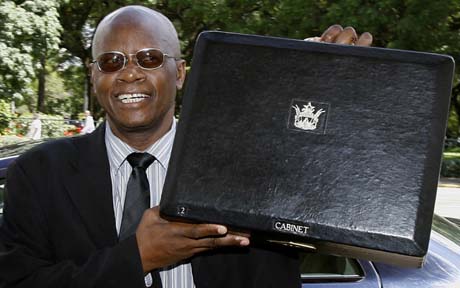New import policies that will soon be introduced by Government to curb the influx of cheap imports will not affect the product supply chain in the country but create a level playing field that will boost productivity in local industries, a senior Government official has said.
Finance Minister Mr Patrick Chinamasa recently indicated that Treasury was exploring measures to both curb the influx of cheap imports and help local industries operate viably.
In an interview with The Sunday Mail Business last week, permanent secretary in the Ministry of Finance Mr Willard Manungo said measures that are being considered by Government do not include banning imports.
He noted that policymakers were instead looking at ways to regulate imports in the same way other countries the world over have done.
"Government has noted the need to support the local manufacturing sector. There is no intention to completely ban imports, but a level playing field has to be created. We have some products that are subsidised in their countries of origin and, when they are imported, they create problems for the local manufacturers and producers and this tends to undermine competitiveness within industry since they are cheaper than the locally manufactured products," said Mr Manungo.
He added that greater co-operation will be forged with the Zimbabwe Revenue Authority to eliminate smuggling.
In 2009, Government reduced import duty on various products in direct response to the shortages that were experienced on the market.
However, imported clothing, textiles, shoes and electrical gadgets have flooded the market of late.
Smuggling through official and unofficial points of entry has worsened the situation.
Production in local industries has consequently declined.
According to the Confederation of Zimbabwe Industries (CZI), capacity utilisation in industry has remained rooted at 44 percent in the wake of biting capital constraints, obsolete machinery and cheap imports.
Minister Chinamasa recently indicated that Government was in the process of crafting policies that will create a conducive business environment for local industries.
He indicated that the measures would include sourcing of funds to recapitalise operations and addressing the rising tide of cheap imports.
It is estimated that about 60 percent of products - foodstuffs, clothes and household essentials - in Zimbabwean shops are imported from countries such as South Africa, China and Nigeria.
Mr Chinamasa was quoted as saying: "We have seen a situation whereby we have turned into a warehouse of imports. Some of the products can be secured locally. Next month we will introduce policies meant to address the issue of cheap imports. But, I advise captains of industry and commerce to increase industrial capacity utilisation to boost production."
Experts say there is a need to address the country's ever-widening trade deficit and imports continue to soar while exports decline.
Import and export data from Zimbabwe Statistics Agency show that the country's trade deficit in the four months to April 2013 rose to $1,6 billion.
Exports in the period amounted to $1,02 billion and imports totalled $2,62 billion.
CZI estimates that the country's manufacturing sector requires at least $2 billion to operate at full capacity.
- sunday mail
 OK Zimbabwe posts US$17,8 million loss
OK Zimbabwe posts US$17,8 million loss  Hichilema meets Chivayo
Hichilema meets Chivayo  Millions celebrate Diwali festival in India
Millions celebrate Diwali festival in India  Econet Zimbabwe to delist from ZSE
Econet Zimbabwe to delist from ZSE  Gold edges up as traders await guidance
Gold edges up as traders await guidance  Mnangagwa fires Chitando, appoints Polite Kambamura
Mnangagwa fires Chitando, appoints Polite Kambamura  Young Investment Professional (YIP) Graduate Programme 2019
Young Investment Professional (YIP) Graduate Programme 2019 











 Young Investment Professional (YIP) Graduate Programme 2019
Young Investment Professional (YIP) Graduate Programme 2019
Editor's Pick